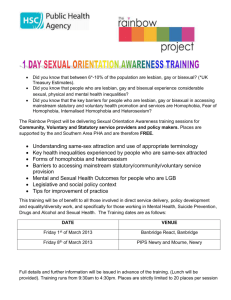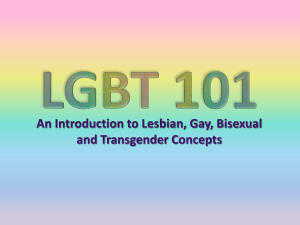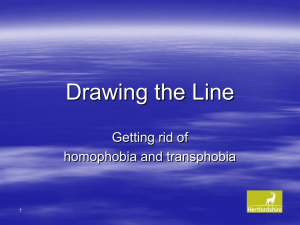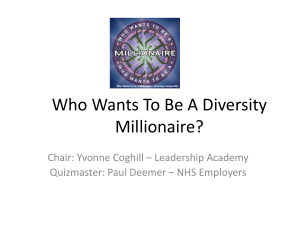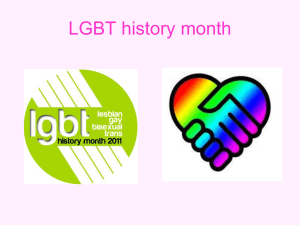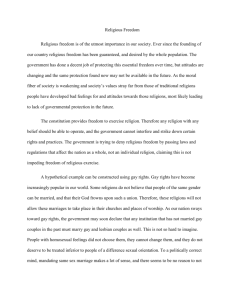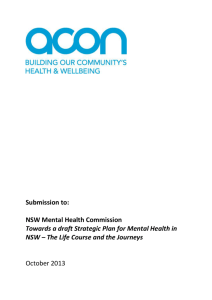Syllabus - Santa Clara University
advertisement
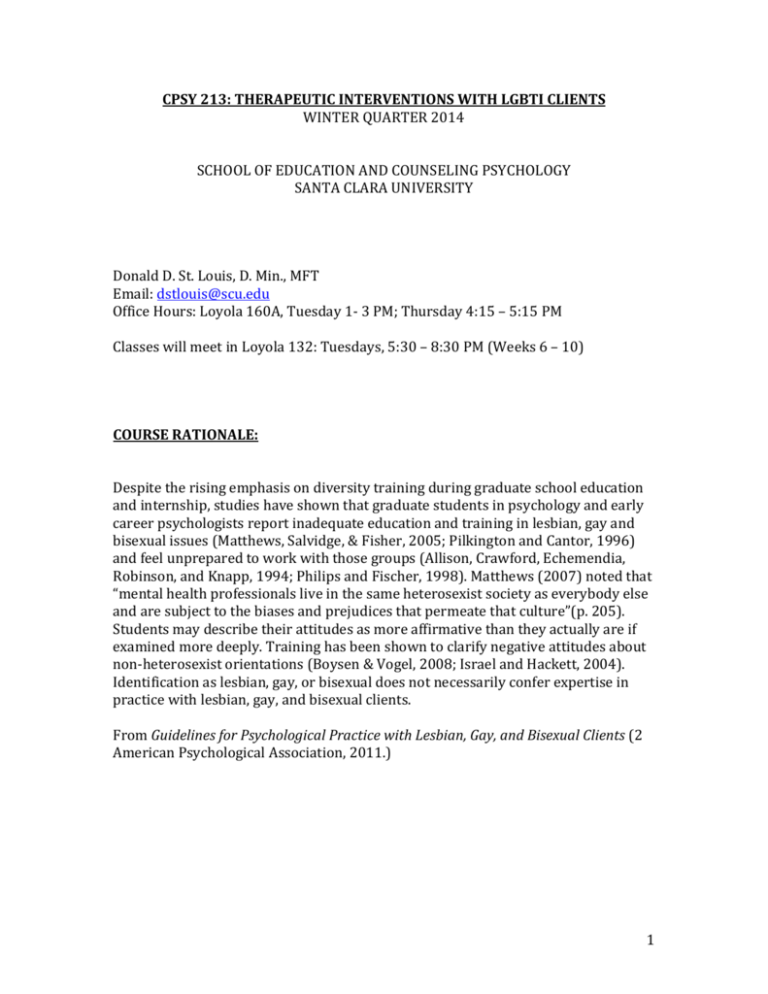
CPSY 213: THERAPEUTIC INTERVENTIONS WITH LGBTI CLIENTS WINTER QUARTER 2014 SCHOOL OF EDUCATION AND COUNSELING PSYCHOLOGY SANTA CLARA UNIVERSITY Donald D. St. Louis, D. Min., MFT Email: dstlouis@scu.edu Office Hours: Loyola 160A, Tuesday 1- 3 PM; Thursday 4:15 – 5:15 PM Classes will meet in Loyola 132: Tuesdays, 5:30 – 8:30 PM (Weeks 6 – 10) COURSE RATIONALE: Despite the rising emphasis on diversity training during graduate school education and internship, studies have shown that graduate students in psychology and early career psychologists report inadequate education and training in lesbian, gay and bisexual issues (Matthews, Salvidge, & Fisher, 2005; Pilkington and Cantor, 1996) and feel unprepared to work with those groups (Allison, Crawford, Echemendia, Robinson, and Knapp, 1994; Philips and Fischer, 1998). Matthews (2007) noted that “mental health professionals live in the same heterosexist society as everybody else and are subject to the biases and prejudices that permeate that culture”(p. 205). Students may describe their attitudes as more affirmative than they actually are if examined more deeply. Training has been shown to clarify negative attitudes about non-heterosexist orientations (Boysen & Vogel, 2008; Israel and Hackett, 2004). Identification as lesbian, gay, or bisexual does not necessarily confer expertise in practice with lesbian, gay, and bisexual clients. From Guidelines for Psychological Practice with Lesbian, Gay, and Bisexual Clients (2 American Psychological Association, 2011.) 1 COURSE DESCRIPTION: This course will provide Counseling Psychology students with an opportunity to familiarize themselves with issues likely to be encountered when working with LGBTI clients. Students will confront their own beliefs and feelings about same sex relationships and how these might impact their clinical work. Topics to be considered: current theories regarding the etiology of homosexuality; the evolving language of the LGBTI culture; developmental challenges for LGBTI persons; homophobia and heterosexism and their many faces; the coming out process (to self and others); relationships with parents and families of LGBTI people; issues of support and socialization; the dynamics of LGBTI relationships; gay marriage; gay families and gay parenting; the impact of AIDS; social, cultural, religious considerations and their impact; issues affecting transgender persons; available resources. COURSE GOALS: Expand exposure to the variety of individuals represented by the LGBTI culture. Increase skill in the recognition of discrimination practices and their psychological impact. Deepen knowledge of gay affirmative theory and practice. Enhance respect for different views in the understanding of LGBTI rights and responsibilities. Explore the nature of partnerships, marriage and parenting, and their emotional significance for LGBTI individuals. Deepen skill in facilitating psychotherapeutic interventions with LGBTI individuals, couples and their families, that are sensitive to clients’ needs and context. COURSE METHODOLOGY AND REQUIREMENTS: 1. Class attendance and active participation. Each class meeting will combine lecture and student activity (discussion, group work, role plays, dialogues with invited speakers, videos, etc.) Because of the highly interactive nature of our meetings and because we have only five classes, consistent attendance is essential. Students are expected to come to class having completed all reading assignments, and ready to actively engage the material under discussion. 2 2. Required texts: Anderson, Kevin. Counseling LGBTI Clients. SAGE Publications, 2013. Kort, Joe. Gay Affirmative Therapy for the Straight Clinician: The Essential Guide. W. W. Norton, 2008. Additionally, on CANVAS there will be a reader consisting of articles that are strongly encouraged, though not required, reading. 3. Weekly Self-Reflective Journal Entries. The Reflective Journal is a personal space for you to respond to the topics presented in class. It is an opportunity for you to reflect more deeply on your own personal experiences and assumptions about LGBTI people and issues, especially as they relate to your role as a clinician. Some weeks, you may be asked to reflect on particular questions assigned by the instructor. These 2-3 page journal entries are to be turned in on a weekly basis. This should be a serious self-reflective process, and should include at least two references to one or more of the resources or readings presented in class. Journals will be evaluated in terms of the depth of your personal exploration and reflection, along with your clear integration of class material. 4. An Interview of an LGBTI Person and a 6-8 page Paper. For this assignment, your task is to interview a lesbian, gay, bisexual, transgender/transsexual, or intersex person or couple (over age 18). If you already have some knowledge of the LGBTI community, select someone from a group about whom you know the least. You may choose friends, friends of friends, acquaintances, neighbors, relatives, etc., but do not select interviewees from among your clients of those of your colleagues, and do not interview a classmate. Interviewees should be told that you are doing this interview as part of an LBGTI-affirmative graduate class to help clinicians-in-training better respond to the needs and issues of this community. Inform the interviewee in advance of the nature of this process (informed consent!) so the interviewee may freely decline to participate, or freely decline to answer any question or topic during the interview. Ask permission to take notes during the interview for purposes of accurate recall. Please note that you are not doing “therapy” or “formal research” in these interviews. You are simply gathering information for a class assignment. You may ask simple clarifying questions in order to better 3 understand the overt content of the interviewee’s response to your questions, but do not probe for “unconscious” or unspoken feelings beyond the overt content the interviewee spontaneously offers. Also, do not give interpretations, analysis, or commentary on the material. You are there to listen and learn, not teach or do therapy. Your clear and consistent focus should be on getting the story from the interviewees’ perspectives and in their own voices. Interview topics and questions: (You are not limited to these topics or questions, but they can be a useful outline.) Family of Origin: When did you first become aware that you might be L, G, B, T, or I? How do you think this “difference” may have affected your relationships with family members as you were growing up? If you have not come out to certain family members, what factors led to this decision? If you have come out to certain family members, describe the process, including what preceded, happened during, and has followed the disclosure up to the present time. If the person is in a same-sex relationship: How do you define being a “couple” (what does it mean to you that you are a “couple”?) What has been the history of your becoming a couple? How did your becoming a couple affect your relationships with other family members, friends, the LGBTI community, the straight community? From your own experience, how do you think LGBTI couple relationships are similar to and/or different from heterosexual couple relationships? What are the challenges LGBTI couples face in a predominantly heterosexual and homophobic society, and how have you dealt with these challenges? Would you get married if you could? Why/why not? For those who are parents: What is the history of your becoming a parent? If your children did not always know you were LGBTI, how did you handle coming out to them? How have they responded? 4 How has being an LGBTI parent affected your relationships with former or current partners (if any), with family members, friends, the LGBTI community and the straight community? From your experience, what are the challenges faced by LGBTI parents in a predominantly heterosexual and homophobic community? What are the challenges that children of LGBTI parents face in a predominantly heterosexual and homophobic society? How does your child relate with you (and your partner, if any) on the issues involved in having LGBTI parents(s)? How does your child deal with his/her friends, teachers, and others around the issue of your being LGBTI? From your experience, how can LGBTI parents prepare or help children deal with these challenges? Families of Choice: How has coming out to friends and peers affected those relationships? Who are the people in your closest social support network (including relatives, friends, co-workers, neighbors, etc.)? How closely do the persons in this network relate to one another? Describe the activities and any “rituals” (birthdays, holidays, couple anniversaries, regular get-togethers for meals) that you participate in with your closest network members. What sorts of mutual emotional support and practical assistance do you and these persons provide for each other? Some LGBTI people consider their closest friends to be “family”, and some authors have used the term “families of choice” to describe these relationships. Does this term fit your experience with your closest friends—have they become a “family”? Religious/spiritual traditions: Did you grow up in a specific religious/spiritual tradition and, if so, what did you learn about being LGBTI from that faith community? What was the response if/when you came out? What is your current relationship to that original religious/spiritual tradition? Do you belong to an organized religious/spiritual community today, and, if so, how does that impact your understanding of yourself as an LGBTI person? 5 Experiences Dealing with Society: Have you ever experienced violence, oppression, job bias, or rejection because of your identity? Have you known others who have? Are there things you do not do, places you do not go because you are LGBTI? How do you feel about the recent changes in attitudes toward LGBTI persons: gay marriage, repeal of Don’t Ask, Don’t Tell, the President of the United States publically supporting gay marriage, etc? Advice to Professionals: Have you utilized psychotherapeutic services in the past, are you now using them, or do you intend to use them in the future? What has been your experience as an LGBTI person in relationship to the professional psychotherapeutic community? What do you think therapists most need to keep in mind when trying to understand and help LGBTI people in individual/couples/family therapy? Are there new kinds of support groups, counseling services, or community organizations that you think need to be developed to help LGBTI couples and families? From your personal experience, what is the most important thing psychotherapists need to know about LGBTI people? The interview itself should last between 1–2 hours. Feel free to edit or omit any of the questions above to fit the circumstances, language, and comfort level of the person(s) you are interviewing. Once you have completed the interview, write a paper (8-10 pages) in which you discuss what you have learned from the process of interviewing an LGBTI person. The focus of this paper is not so much about the interviewed person him/herself, but about YOU and what you have experienced and learned about what it is like to be LGBTI. Discuss your reactions as the interviewee revealed personal information about family of origin, social relationships, personal challenges, etc. Has this assignment changed your view/understanding of LGBTI persons, and if so, how? Has it changed how you might conduct a clinical assessment? Were you surprised at what people revealed? Has it changed you? 6 Elements that will be included in the evaluation of your paper: evidence of a thoughtful approach to the topic; depth of understanding of material presented in the interview; depth of personal exploration and reflections. COURSE GRADING: Class Participation: 25% Self-Reflective Journal 30% Interview/Paper 40% Please note: ALL written assignments should, of course, reflect graduate level writing. This means, at the very least, no spelling errors, correct grammatical constructions, proper use of punctuation, and APA style citations and references. Attention will be paid to writing skills in grading. Please carefully proofread all written assignments. Students who need additional help with writing skills should seek appropriate assistance from university resources before submitting assignments for grading. Students may find the following publications helpful: Strumpf, Michael, and Douglas, Ariel. The Grammar Bible. New York: St. Martin’s Griffin, 2004. Strunk, William, and White, E. B. The Elements of Style. New York: Longman Books, 2000. Fourth Edition. Truss, Lynne. Eats, Shoots and Leaves. New York: Gotham Books, 2004. 7 OVERVIEW OF CLASS MEETINGS CLASS #1: (02/11/14) READINGS Required: Anderson: Ch. 1: “Introduction”, including the test from The Heterosexism Inquirer (Pp.1-16). Ch. 2: “Historical and Contemporary Perspectives Regarding LGBTI Individuals” (Pp. 17-33). Appendix A: “Glossary” (Pp. 231-234) Appendix C: “Sexuality Questionnaire” (Pp. 247-252) Kort: Ch. 1: “Psychotherapy for Lesbians and Gays: Setting the Gay Record— Straight!” (Pp. 1-17). Ch. 2: “What Is Gay Affirmative Therapy?” (Pp. 18-32). Recommended: Beckstead, A. Lee. “Can We Change Sexual Orientation?” Archives of Sexual Behavior 41 (2012): 121-134. Haider-Markel, Donald P. and Mark R. Joslyn. “Beliefs About the Origins of Homosexuality and Support for Gay Rights: An Empirical Test of Attribution Theory.” Public Opinion Quarterly 72 (2008): 291-310. Pew Research Center: A Survey of LGBT Americans: Attitudes, Experiences, and Values in Changing Times. June 13, 2013. TOPICS: Introduction to Course Personal beliefs about Homosexuality and Experiences with LGBTI Persons Exploding Myths and Stereotypes The Growing Vocabulary of the LGBTI World Videos 8 CLASS #2: (02/18/14) READINGS: Required: Anderson: Appendix D: “The Sexual Orientation Counselor Competency Scale” (Pp.253-258). Ch. 3. “Gay Boys and Men” (Pp. 14-65). Ch. 4: “Lesbian Girls and Women” (Pp. 66-96). Kort: Ch. 3: “Growing Up Lesbian or Gay” (Pp. 33-46). Ch. 4: “Covert Cultural Sexual Abuse” (Pp. 47-70). Ch. 5: Post-Traumatic Stress Disorder From Growing Up Lesbian or Gay” (Pp.71-98). Recommended: Bybee, Jane A., Eric L. Sullivan, Erich Zielonka and Elizabeth Moses. “Are Gay Men in Worse Mental Health Than Heterosexual Men? The Role of Age, Shame and Guilt, and Coming Out.” Journal of Adult Development 16 (2009): 144-154. Ganzevoort, R. Ruard, Mark Van der Laan and Erik Olsman. “Growing Up Gay and Religious: Conflict, Dialogue, and Religious Identity Strategies.” Mental Health, Religion and Culture 14 (2011): 209-222. Robert, Andrea L., S. Bryn Austin, Heather L. Corliss, Ashley K. Vandermorris and Karestan C. Koenen. “Pervasive Trauma Exposure Among US Sexual Orientation Minority Adults and Risk of Posttraumatic Stress Disorder.” American Journal of Public Health 100 (2010): 2433-2441. Scourfield, Jonathan, Katrina Roen and Liz McDermott. “Lesbian, Gay, Bisexual and Transgender Young People’s Experiences of Distress, Resilience, Ambivalence and Self-Destructive Behavior.” Health and Social Care in the Community 16 (2008): 329336., 9 TOPICS: Growing up LGBTI: “stranger in a strange land” Heteronormativity and its impact on LGBTI persons Homophobia and its many expressions Coming Out Internalized homophobia Gay Affirmative Therapies Case Studies/Video Guest Speakers CLASS #3: (02/25/14) READINGS: Required: Anderson: Ch. 5: “Bisexual Boys and Men” (Pp. 97-120). Ch. 6: “Bisexual Girls and Women” (Pp. 121-137). Ch. 7: “Fetishistic Crossdressing Children and Women” (Pp. 138-159). Kort: Ch. 6: “Developmental Insults” (Pp. 99-121). Ch. 7: ”Coming Out” (Pp. 122-148). Recommended: Beeler, Jeff and Vicky DiProva. “Family Adjustment Following Disclosure of Homosexuality by a Member: Themes Discerned in Narrative Accounts.” Journal of Marital and Family Therapy 25 (1999): 443-459. 10 Floyd, Frank J. and Roger Bakeman. “Coming-Out Across the Life Course: Implications and Historical Context.” Archives of Sexual Behavior 35 (2006): 287296. Green, Robert-Jay. “Lesbians, Gay Men, and Their Parents: A Critique of LaSala and the Prevailing Clinical ‘Wisdom’.” Family Process 39 (2000): 257-266. Newman, Bernie Sue and Peter Gerard Muzzonigro. “The Effects of Traditional Family Values on the Coming Out Process of Gay Male Adolescents.” Adolescence 28 (1993): 213-26. Saltzburg, Susan. “Parents’ Experience of Feeling Socially Supported as Adolescents Come Out as Lesbian and Gay: A Phenomenological Study.” Journal of Family Social Work 12 (2009): 340-358. TOPICS: Bisexuality Fetishes Coming Out (cont.) Videos Role Plays Guest Speakers 11 Class #4: (03/04/14) READINGS: Required: Anderson: Ch. 8: “Transsexual Boys and Transwomen” (Pp. 160-186). Ch. 9: “Transsexual Girls and Transmen” (Pp. 187-203). Kort: Ch. 8: “Helping Families of Lesbians and Gays” (Pp. 149-170). Ch. 9: “Lesbian and Gay Sexuality” (Pp. 171-197). Recommended: Fitzgerald, Bridget. “Children of Lesbian and Gay Parents: A Review of the Literature.” Marriage and Family Review 29 (1999): 57-75. Grossman, Arnold H. and Anthony R. D’Augelli. “Transgender Youth: Invisible and Vulnerable.” Journal of Homosexuality 51 (2006): 111-128. Mohr, Jonathan J. and Ruth E. Fassinger. “Sexual Orientation, Identity and Romantic Relationship Quality in Same-Sex Couples.” Personality and Social Psychology Bulletin 32 (2006): 1085-1099. Pachankis, John E. and Marvin R. Goldfried. “Clinical Issues in Working with Lesbian, Gay, and Bisexual Clients.” Psychotherapy: Theory, Research, Practice, Teaching 41 (2004): 227-246. TOPICS Transexualism The dynamics of LBGTI relationships Issues confronting LGBTI couples Differences in Gay male and lesbian relationships Gay marriage and gay parenting Videos/role plays Guest Speakers 12 CLASS #5: (03/11/14) READINGS: Required: Anderson: Ch. 10: “Intersex Children and Adults” (Pp. 204-225) Ch. 11: “Conclusions” (Pp. 226-230) Kort: Ch. 10: “Working with Today’s Lesbians and Gay Couples” (Pp. 198226) Ch. 11: “The New Mixed Marriage: One Lesbian or Gay Spouse and One Straight” (Pp. 226-243). Ch. 12: “Gay Affirmative Therapy Principles in Clinical Practice: Establishing a Differential Diagnosis” (Pp. 244-263) Recommended: Barton, Bernadette. “Abomination: Life as a Bible Belt Gay.” Journal of Homosexuality 57 (2010): 465-484. Cramer, Robert J., Frank D. Golom, Charles LoPresto and Shalene M. Kirkley. “Weighing the Evidence: Empirical Assessment and Ethical Implications of Conversion Therapy.” Ethics and Behavior 18 (2008): 93-114. Ginicola, Misty M. and Cheri Smith. “The Church, the Closet, and the Couch: The Counselor’s Role in Assisting Clients to Integrate Their Sexual Orientation and Religious Identity.” Journal of LGBT Issues in Counseling 5 (2011): 304-326. Green, Robert-Jay. “When Therapists Do Not Want Their Clients To Be Homosexual: A Response to Rosik’s Article.” Journal of Marital and Family Therapy 29 (2003): 2938. Green, Robert-Jay and Valory Mitchell. “Gay and Lesbian Couples in Therapy: Minority Stress, Relational Ambiguity, and Families of Choice.” in Clinical Handbook of Couple Therapy (4th edition), Edited by Alan S. Gurman, Guilford Press, 2008: 662680). 13 Hansen, Jennifer E. and Serena M. Lambert. “Grief and Loss of Religion: The Experiences of Four Rural Lesbians.” Journal of Lesbian Studies 15 (2011): 187-196. Sullivan, Andrew. “Why Gay Marriage is Good for Straight America.” Newsweek, July 18, 2011. TOPICS: Therapeutic Guidelines for working with LGBTI clients Issues of special concern Gay affirmative spirituality Recapitulation and course conclusions Course Evaluations… 14 CONSENT FORM TO BE INTERVIEWED FOR A GRADUATE COUNSELING PSYCHOLOGY CLASS By signing this consent form, I am agreeing to be interviewed by a graduate student from the Counseling Psychology Department of Santa Clara University, as part of an assignment for her/his graduate class. I understand that this participation is simply to help the graduate student fulfill a class assignment and learn more about human behavior. The interview, which will last between one and two hours, is not part of any formal research project, assessment procedure, or treatment program. I am freely participating in this interview without any coercion, without any compensation, and without any expectation of a summary or feedback after the interview. I understand that the questions asked will be of a personal nature, focusing on my experience and feelings while growing up, my family relationships, and my recent relationships. I am free not to participate in this interview, to stop the interview at any time, and to decline to answer any specific question during the interview. My name and other identifying information about me will be omitted or fully disguised when the interview results are described in the student’s written assignment, which only the professor will read. One signed copy of the consent form will be stored in a locked file by the student interviewer; a second copy will be kept in a locked file by the course instructor, and both of these signed consent forms will be kept separate from any other information based on the interview. The third copy of the consent form is for me to keep. Signature(s) of Interviewee(s) Date Signature of Student (Interviewer) Date Instructor Information: Donald D. St. Louis, D. Min., MFT Lecturer, Graduate Program in Counseling Psychology Santa Clara University dstlouis@scu.edu (408) 551-1603 15 THE AMERICAN PSYCHOLOGICAL ASSOCIATION’S PRACTICE GUIDELINES FOR LGB CLIENTS (2011) Attitudes Toward Homosexuality and Bisexuality Guideline 1: Psychologists strive to understand the effects of stigma (i.e., prejudice, discrimination, and violence) and its various contextual manifestations in the lives of lesbian, gay, and bisexual people. Guideline 2: Psychologists understand that lesbian, gay, and bisexual orientations are not mental illnesses. Guideline 3: Psychologists understand that same-sex attractions, feelings, and behavior are normal variants of human sexuality and that efforts to change sexual orientation have not been shown to be effective or safe. Guideline 4: Psychologists are encouraged to recognize how their attitudes and knowledge about lesbian, gay, and bisexual issues may be relevant to assessment and treatment and seek consultation or make appropriate referrals when indicated. Guidelines 5: Psychologists strive to recognize the unique experience of bisexual individuals. Relationships and Families Guideline 7: Psychologists strive to be knowledgeable about and respect the importance of lesbian, gay, and bisexual relationships. Guideline 8: Psychologists strive to understand the experiences and challenges faced by lesbian, gay, and bisexual parents. Guideline 9: Psychologists recognize that the families of lesbian, gay, and bisexual people may include people who are not legally or biologically related. Guideline 10: Psychologists strive to understand the ways in which a person’s lesbian, gay, or bisexual orientation may have an impact on his or her family of origin and the relationship with that family of origin. 16 Issues of Diversity Guideline 11: Psychologists strive to recognize the challenges related to multiple and often conflicting norms, values, and beliefs faced by lesbians, gay and bisexual members of racial and ethnic minorities. Guidelines 12: Psychologists are encouraged to consider the influences of religion and spirituality in the lives of lesbian, gay, and bisexual persons. Guideline 13: Psychologists strive to recognize cohort and age differences among lesbian, gay, and bisexual individuals. Guideline 14: Psychologists strive to understand the unique problems and risks that exist for lesbian, gay, and bisexual youth. Guideline 15: Psychologists are encouraged to recognize the particular challenges that lesbian, gay, and bisexual individuals with physical-sensory and cognitiveemotional disabilities experience. Guideline 16: Psychologists strive to understand the impact of HIV/AIDS on the lives of lesbian, gay, and bisexual individuals and communities. Economic and Workplace Issues Guideline 17: Psychologists are encouraged to consider the impact of socioeconomic status on the psychological well being of lesbian, gay and bisexual clients. Guideline 18: Psychologists strive to understand the unique workplace issues that exist for lesbian, gay, and bisexual individuals. Education and Training Guideline 19: Psychologists strive to include lesbian, gay, and bisexual issues in professional education and training. Guideline 20: Psychologists are encouraged to increase their knowledge and understanding of homosexuality and bisexuality through continuing education, training, supervision, and consultation. Research Guideline 21: In the use and dissemination of research on sexual orientation and related issues, psychologists strive to represent results fully and accurately and to be mindful of the potential misuses or misrepresentation of research findings. 17 APA GUIDELINES ON STUDENT SELF-DISCLOSURE The professional training philosophy of the Counseling Psychology Department is predicated on the notion that an effective counselor must be a whole person. Indeed, in the practice of counseling it is the person of the counselor that is a major component of healing. As a counselor-in-training, then, self-reflection is a necessary and required part of the training that helps one better understand and empathize with his/her future clients’ experience. Such reflection is a significant component of one’s personal and professional development as an effective and sensitive instrument of change. Thus, it is customary that in the CPSY Masters Program’s classes at CSU students are regularly assigned work that involves self-disclosure and personal study of the content of that self-disclosure. Students are expected to reflect on their past and present personal experiences in courses and program related activities, in oral and/or in written assignments. We respects students’ rights to confidentiality, and do not require that any particular or specific information be disclosed. Moreover, we do not evaluate students’ progress in the program based on the disclosure of specific information (except as mandated by ethics codes or law). It is our experience that this philosophy and related formats in our classes provide a rich and superlative educational experience, involving more aspects of student experience than do standard lectures or written material which do not include the person of the therapist in training. COUNSELING PSYCHOLOGY DEPARTMENT Grading Guidelines, 2013-2014 It is customary in graduate programs that final course grades of B, B+, A- and A are acceptable for graduate study. Grades of B- and below indicate that a student has done inferior work at a sub-graduate school level. A student with an average of lower than 3.0 is on probation and if that GPA is maintained, is disqualified. The grading policy in CPSY is that students earn A grades through consistent and high quality work. We do not have a system where everyone begins with an A and then loses points to lower grades. 18 In a normal class the range of final course grades is from B to A with a mean in the A-/B+ range. The range may be quite a bit wider on individual papers, exams, or projects that make up the final grade. Professors may give grades of C for inferior work. A grade of C in any class, except CPSY 200 and CPSY 227, must be balanced by higher grades to yield a 3.0 or better GPA. Grades of D or F, or a B- or below in CPSY 200 or 227, automatically disqualify a student from continuing in the program. In some specialty and advanced classes, there are a greater percentage of A grades. Grades of Incomplete are to be given for extraordinary circumstances. Incompletes must be made up within four weeks of the succeeding term (except Summer) or they revert automatically to a grade of F, and the student is disqualified. The four week period must allow sufficient time for the Professor to grade and record the submitted work. Extensions to an Incomplete are rare, must be in writing and contracted with the Professor. Normally, attendance is required for classes. One miss out of 10 three-hour classes is considered the maximum that may be missed without penalty. If a student misses a second class, it is at the instructor’s discretion to give a grade of NR (No Record), Inc., or to reduce a grade for lack of class participation. Any student who misses more than two classes should receive a grade of Incomplete and repeat the course. DISABILITY ACCOMMODATION POLICY To request accommodations for a disability, students must contact Disability Resources, located in Benson Center 216 (408-554-4109). Students must provide documentation of a disability to Disability Resources prior to receiving accommodations. CLASSROOM PROTOCOL FOR CELL PHONES, PAGERS, TEXT MESSAGING, INTERNET BROWSING Please be sure to turn off cell phones, pagers, notepads, etc. when you are in class. It is definitely not appropriate to text message, tweet, internet browse or to engage in any other form of cyber behavior during class. Students engaging in these practices will be identified as not ready to pursue serious graduate study. Most faculty will simply lower the student’s grade a full letter. BTW—It is obvious from the front of the room! 19
